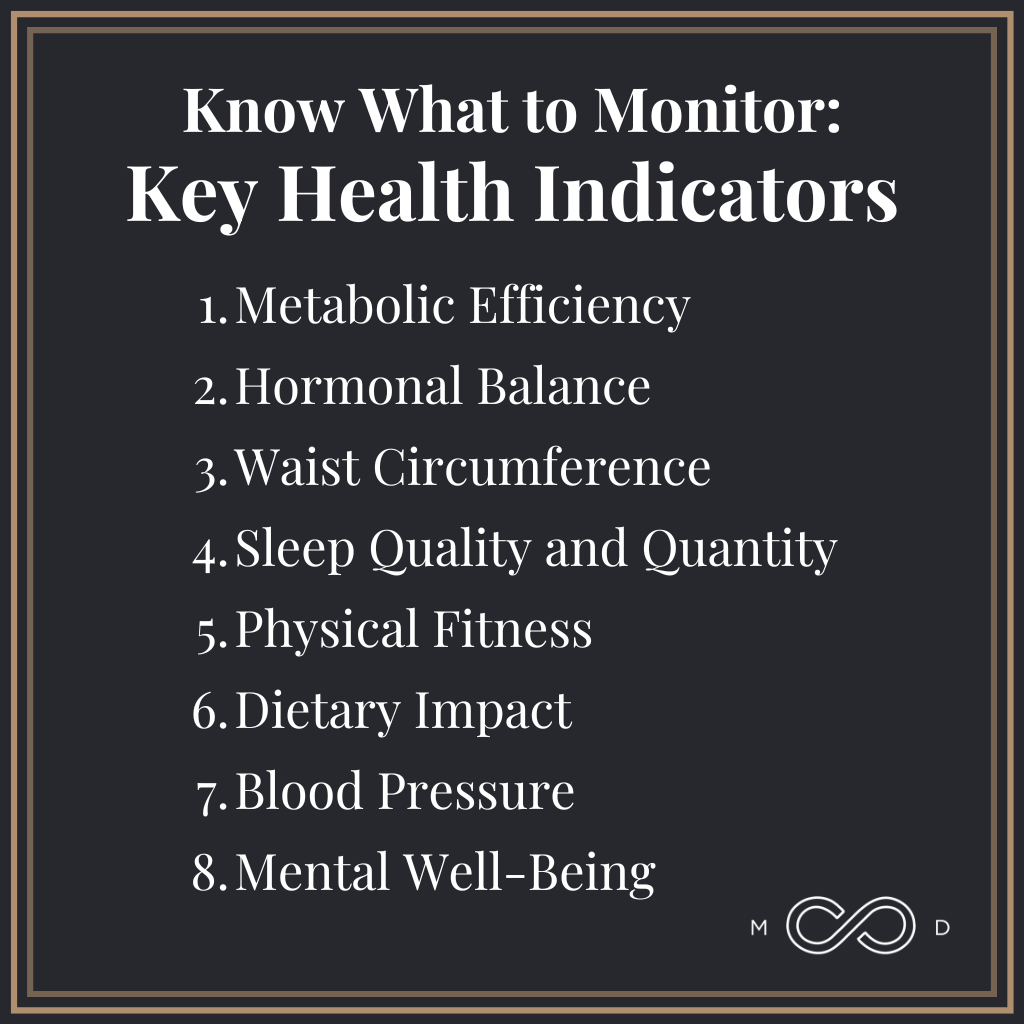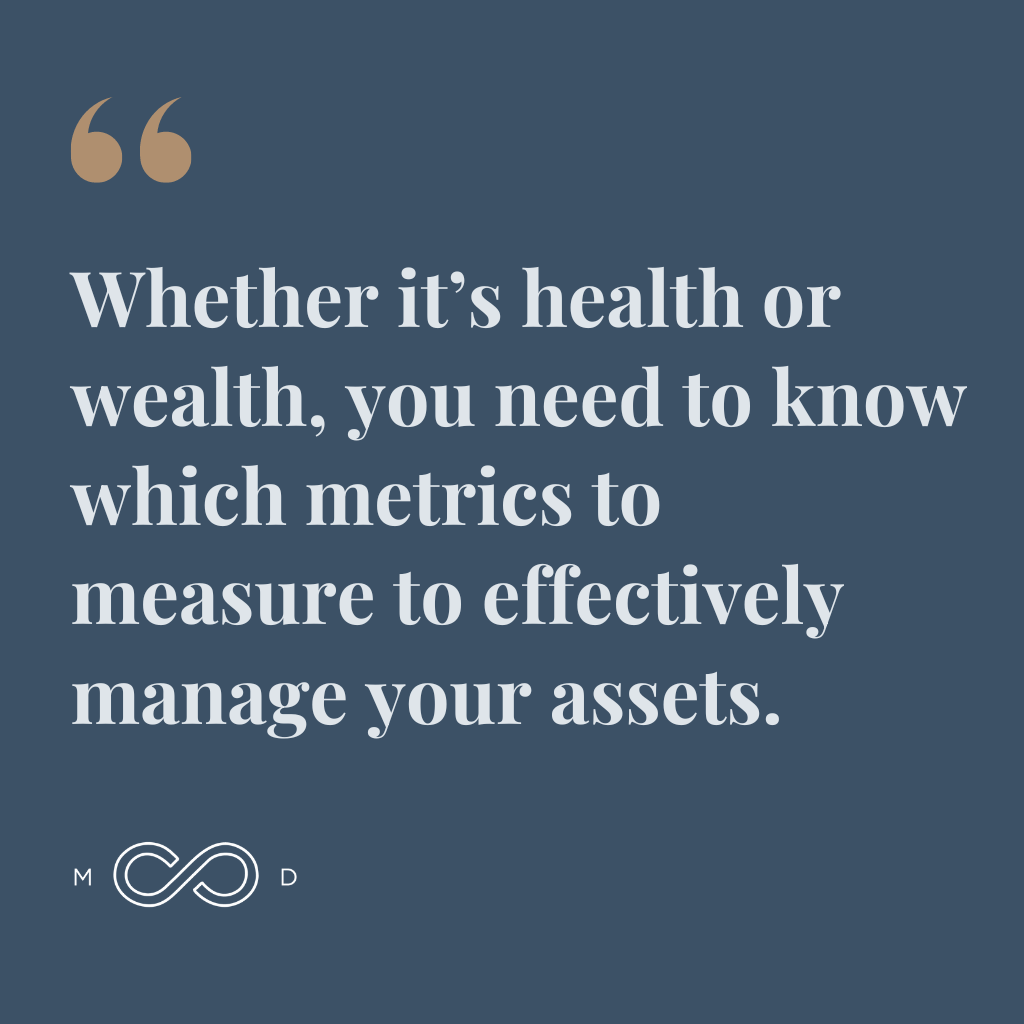At Brentwood MD, we view our role in our members’ health journeys as health asset managers. In other words, we help you manage your health assets in the same future-focused, risk-managed, vigorous manner as a wealth manager cares for your finances.
Imagine applying the same vigor to your health assets as you do to your financial assets; how much greater return could you foster in your personal health and longevity?
The Role of a Health Asset Manager
You hire a wealth asset manager to help you structure and execute a plan to grow your economic stability while diversifying and risk managing events over time. As health asset managers, we take a similar approach.
As health asset managers, we focus on understanding the full context of each individual’s health — their unique perspectives, personal challenges, history, goals, and more. This picture of the total human allows us to then help them navigate their health journey to achieve their health goals while managing anything alarming that comes up along the way.
Know What to Monitor: Key Health Indicators
Whether it’s health or wealth, you need to know which metrics to measure to effectively manage your assets.
In our role as health asset managers, we’ve identified certain specific factors that make a massive impact on patients’ health returns. Like key performance indicators in business, these key health indicators (KHIs) provide valuable benchmarks for assessing and improving your overall health performance.
1. Metabolic Efficiency
A foundational key health indicator we’ve identified for our patients is metabolic efficiency. In other words, how well does your body process glucose, and where do you fall on the spectrum of insulin sensitivity versus resistance?
Addressing this one KHI helps many people avoid a host of serious downstream health consequences, such as type 2 diabetes and cardiovascular disease. Consequently, moving away from insulin resistance and toward insulin sensitivity is the number one improvement we aim for with our members.
Metabolic KHI Hack: Continuous Glucose Monitors
While general principles may tell you which foods help or hinder your metabolic fitness, nothing beats data on how each unique individual responds to various diet and exercise changes.
To get these personalized insights, I may recommend patients try a continuous glucose monitor (CGM). These little devices provide a real-time window into your particular physiological responses to glucose and exercise, enabling you to make precise dietary and activity modifications suited to how your body operates.
2. Hormonal Balance
Your hormonal state, specifically regarding testosterone, estrogen, progesterone, and thyroid, has a huge impact on your health. These four hormones regulate all kinds of processes in your body, from metabolism to mood to muscle strength.
Imbalances in the neuro-hormonal environment can lead to symptoms ranging from fatigue and weight gain to more severe health issues.
3. Waist Circumference
Despite its simplicity, waist circumference is one of the clearest indicators of all-cause mortality we have. It’s so well-known that it has become easy to overlook, but the fact remains: The larger your waistline, the greater the chance that one of the top killers of humans will take you off this planet.
Measuring your waistline is a simple, easy task that gives you tremendous insight into your metabolic health, especially in relation to visceral fat. It provides a convenient external indicator that can encourage you in healthy modifications and warn you when you’re slipping.
4. Sleep Quality and Quantity
Sleep has a health-multiplying impact, affecting everything from brain function and mood to metabolic health and immune function. Monitoring both the quantity and quality of sleep provides insights into your overall health status. Poor sleep quality or insufficient sleep duration are linked to numerous health risks, but incremental improvements in this one area have profound downstream effects.
5. Physical Fitness
Our bodies are the vehicles of our lives, and they’re made to move. Physical activity improves nearly every aspect of health, from enhancing metabolic efficiency to reducing the risk of chronic diseases and improving mental health. This KHI becomes increasingly important with age; when it comes to factors like strength and muscle maintenance, if you don’t use it, you lose it.
6. Dietary Impact
One of the crucial pillars of health and a vital KHI is how you feed your body. Of course, most people realize that what you put in your body as a source of fuel matters, as does how much. But a less well-known factor — one that many people find easier to modify — is when you feed your body.
Adjusting the timing of your food intake allows you to take control of your metabolic health and prevent downstream disease with a far greater success rate than traditional “dieting.”
7. Blood Pressure
Hypertension is referred to as the “silent killer” for a reason. High blood pressure lurks under the radar, ever present, causing enormous damage over time without your knowledge. You don’t see, feel, hear, taste, or in any way sense high blood pressure — unless it’s very high, and by then you’ve had it for a while.
Getting eyes on your blood pressure through regular monitoring is essential for a proactive health approach.
8. Mental Well-Being
We spend a lot of time in medicine talking about lab tests and images, which are certainly important. But the human experience isn’t only physical; it’s an emotional and spiritual journey as well. Consequently, we can’t ignore the crucial role of mental health.
When we see patients begin to allocate greater resources toward improving their relationships with themselves and with those they’re close to, we start to see breakthroughs take place. Any comprehensive health and longevity strategy most certainly includes optimizing your mental health.
Embrace Proactive Healthcare
The entirety of this country’s existing traditional healthcare model is rooted in a reactionary, defensive posture. If you have symptoms, then we take action. But by the time symptoms appear, disease or dysfunction already exists.
This defensive nature inherently limits the potential for preventative care, as the system is geared toward fighting fires rather than preventing the sparks that start them.
As a concierge practice, we operate on a new system — one that takes an offense-based approach. Rather than waiting around to react to symptoms when they appear, we work with patients to optimize and maintain their health to avoid those symptoms in the first place.
- Find Your Team. Look for a physician and practice you can speak with about your health goals and who will help you identify where to direct your attention.
- Identify Your Top KHIs. Determine which KHIs will best move the needle toward your health goals at this time.
- Measure as You Go. As you work on specific KHIs, monitor your progress to ensure your efforts make the predicted impact.
- Course Correct as Needed. If you don’t see the progress you and your doctor expect, then make modifications until you do.
Diabetes, dementia, heart disease — not one of these top killers crops up overnight. They’re chronic, progressive diseases, and once the conditions that produce them appear (high blood pressure, insulin resistance, expanded waistline, etc.), intentional effort is needed to slow or reverse the process.
By paying attention to real-time feedback on KHIs, you broaden your visibility of what’s on the horizon for your health. You can better see what’s coming, and you have more time to course correct when needed. At the same time, your heightened awareness keeps you alert to any unpredictable health factors that might sneak in during the short term, giving you the ability to address them as quickly as possible.
Health Tracking Apps
We know from experience that what patients manage, what they pay attention to, improves. And, practically speaking, what you measure, you can manage.
All health progress takes place in one of three key areas:
- Nutrition, or how you feed your body
- Physical activity, or how you move your body
- Rest, or how you recover your body
Modern tools offer some truly game-changing means of tracking KHIs in each of these categories. Let’s look at a few ways to employ them for optimal health.
Managing Nutrition
While apps and wearables don’t passively track your food intake just yet, they do offer a window into the state of your nutrition. Food journaling apps like MyFitnessPal let you track what you eat and help you understand your caloric and nutrient intake over time. Pairing this with a continuous glucose monitor for two weeks offers enormous insights into how specific foods affect your blood sugar levels.
This combo allows for a highly personalized approach to nutrition and dietary habits.
Monitoring Physical Activity
Wearables like Apple Watch, Fitbit, WHOOP, and Oura Ring passively collect data on movement, allowing you to see patterns and trends in your activity levels. You may discover that you aren’t as active as you thought, or that you’re overtraining without enough time to recover.
Whatever the results, having the data gives you the opportunity to make an informed change.
Enhancing Recovery
Recovery, particularly sleep, is the way your body repairs and rejuvenates — crucial yet often overlooked processes. Again, wearables like a WHOOP band and Oura Ring excel in sleep tracking and provide detailed insights into sleep quality, duration, and stages.
Sleep data can be instrumental in identifying patterns or deficiencies in your sleep habits and improving your sleep quality organically (such as adjusting your bedtime, modifying your pre-sleep routine, or changing your sleeping environment).
Find a Proactive Health Asset Manager
As passionate health asset managers, we here at Brentwood MD pay close attention to the metrics that matter for our patients. If you’re interested in doing the same, find a team that supports you in a proactive, offensive approach to health.
As you start measuring your health assets, take note of where you are and where you want to go. As you work together to give your KHIs the attention they need, you and your team should see a compounding return over time.

Dr. Aaron Wenzel is a concierge physician specializing in the care of fast-moving entrepreneurs, executives, and public figures in the Nashville, TN area. Dr. Wenzel’s diverse life experience and extensive training in family medicine, emergency care, nutrition, and hormone replacement therapies give him the unique platform to provide unmatched care for his patients.









